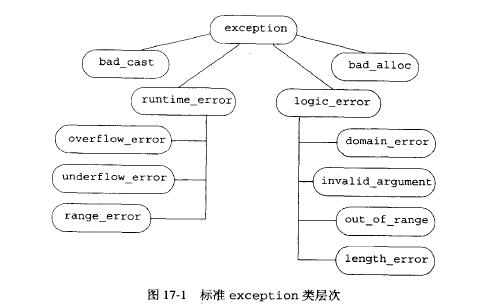C++标准库异常类继承层次中的根类为exception,其定义在exception头文件中,它是C++标准库所有函数抛出异常的基类,exception的接口定义如下:
namespace std {
class exception {
public:
exception() throw(); //不抛出任何异常
exception(const exception& e) throw();
exception& operator= (const exception& e) throw();
virtual ~exception() throw)();
virtual const char* what() const throw(); //返回异常的描述信息
};
}
除了exception类,C++还提供了一些类,用于报告程序不正常的情况,在这些预定义的类中反映的错误模型中,主要包含逻辑错误和运行时错误两大类。
逻辑错误主要包括invalid_argument, out_of_range, length_error, domain_error。当函数接收到无效的实参,会抛出invaild_argument异常,如果函数接收到超出期望范围的实参,会抛出out_of_range异常,等等。
namespace std {
class logic_error: public exception {
public:
explicit logic_error(const string &what_arg); //关键字explicit 显式调用构造函数---见下文
};
class invalid_argument: public logic_error {
public:
explicit invalid_argument(const string &what_arg);
};
class out_of_range: public logic_error {
public:
explicit out_of_range(const string &what_arg);
};
class length_error: public logic_error {
public:
explicit length_error(const string &what_arg);
};
class domain_error: public logic_error {
public:
explicit domain_error(const string &what_arg); //域名错误
};
}
运行时错误由程序域之外的事件引发,只有在运行时才能检测,主要包括range_error, overflow_error, underflow_error。函数可以通过抛出range_error报告算术运算中的范围错误,通过抛出overflow_error报告溢出错误。
namespace std {
class runtime_error: public exception {
public:
explicit runtime_error(const string &what_arg);
};
class range_error: public runtime_error {
public:
explicit range_error(const string &what_arg);
};
class overflow_error: public runtime_error {
public:
explicit overflow_error(const string &what_arg);
};
class underflow_error: public runtime_error {
public:
explicit underflow_error(const string &what_arg);
};
}
另外,在new头文件中定义了bad_alloc异常,exception也是bad_alloc的基类,用于报告new操作符不能正确分配内存的情形。当dynamic_cast失败时,程序会抛出bad_cast异常类,其也继承自exception类。
